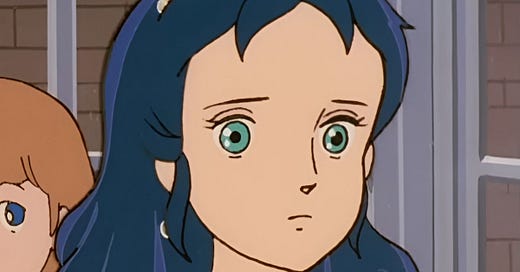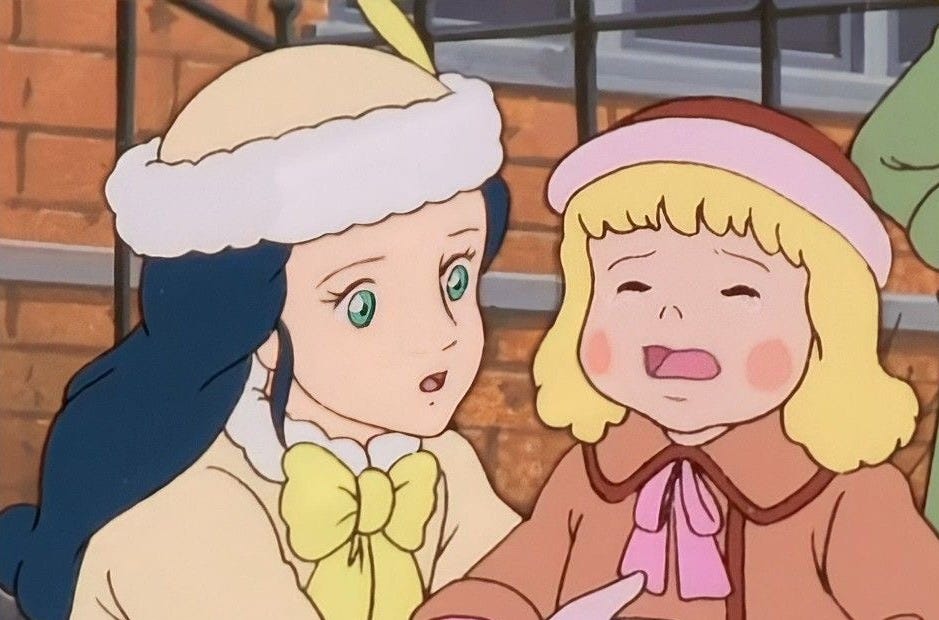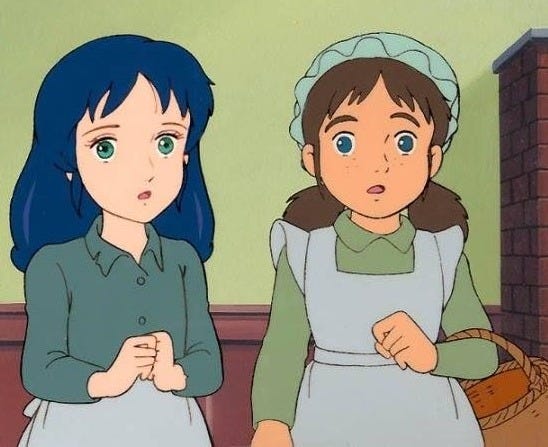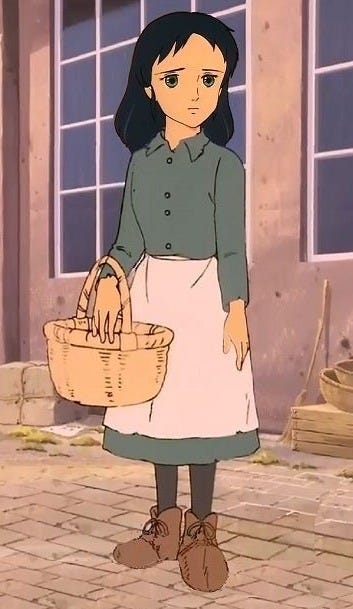A Children’s Novel Taught Me Grace Again
Lessons from A Little Princess on becoming a Princess
Many of us who use social media have come across the term 'femme fatale' & 'bad b*tch' alongside the various adjectives used to describe such women - mysterious (often the most predictable), seductive (to a 13 year old boy going through puberty maybe), that girl (copy paste! which one again?) and on & on. Women claim to be their ‘best self’ which involves not obsessing over men and yet build their 'main character vibe' that is more appropriately a caricature fit to be in a satirist column written by a man. This reel-ified mass hysteria has also given birth to the term 'princess treatment' - where the recipient engages in a series of performative actions that don't come naturally (because it's not true love) such as stepping into her 'femininine energy' to 'manipulate' a man into paying for her dinner. If only 'princess behaviour' was a trend, I would not have to learn it again from a cartoon adaptation of a children's novel.
The said cartoon adaptation is a part of the World Masterpiece Theater (1969-2009) by Nippon Animation based on classic European novels like Anne of the Green Gables, Heidi, Adventures of Tom Sawyer and A Little Princess (1905) by Frances Hodgson Burnett which is what inspired me to write this essay.
It starts with Sara Crewe being dropped off by her doting father (a wealthy officer in British India) to a boarding school in London run by the fake & opportunistic Miss Minchin who takes an immediate disliking to Sara but pretends to be nice to her because of her father's wealth. Sara's father ensures she gets the best of the best - a private suite with decor suitable for a girl, custom made dresses & her own carriage with a pony. She is the immediate fascination of everyone and incites jealousy in Miss Minchin & one of her classmates, Lavinia. It is important to note that even with everything handed to her, Sara is never haughty, is kind to everyone and stands up for the bullied. Material wealth does not corrupt her because her heart is incorruptible.
One of the first instances where we see Sara's good heart & empathic nature is when she offers to become a 'mama' to the 4 year old Lotte whose mother has passed away, just like Sara's. Lotte is often crying & trying to run away from the boarding school but after Sara's kindness, she stops. She refers to Sara as "Mamma Sara" from here on. Lotte had been in the school prior to Sara's arrival but the headmistress, the teachers and the other students could not understand & console Lotte, let alone give her what she needed - a maternal figure. Treating our most innocent & vulnerable with love, respect and understanding their needs constitutes the making of a princess, it is inherent to every normal girl. There is a reason why in classic fairy-tales, the one to "eat" innocent children was always a witch.
Another character Sara touches with her kindness is the scullery maid of their school, Becky. Becky and Sara are of the same age, but because of fate one has the privilege to be educated and be taken care of, the other one is not literate and is the caretaker. Becky is the eldest daughter and is the sole earner of her family, she has to work for the whole day and is given an attic to live in. She is mistreated severely by every adult around her because of her supposed place in society even though she is just a child too. To every other student, Becky is an object to be pitied at but to Sara, Becky is just like Cinderella. When Becky enters a classroom to a light a fire and is covered in cinders, Sara makes sure she hears the story of Cinderella to boost her self-esteem. Sara uses her knowledge to empower others & to make every situation beautiful through the power of imagination - something she will need when everything comes crashing down for her.
A letter arrives from India, that her father has invested in a diamond mine which will make them even wealthier - the Headmistress Miss Minchin sees this opportunity and seizes the chance to favour Sara even more. She uses her own money to give Sara the best birthday party, hoping to cajole her father into becoming an investor for the school. During the birthday party, Sara's father's lawyer arrives to inform her that her father has passed away due to sickness and the mines turned out to be a bad investment as they were depleted, leaving her with absolutely no inheritance. The cruel Miss Minchin now has no obligation to be fake and shows her real face, she coaxes Sara into becoming a servant at the same school. Her father's lawyer steals all of her luxurious belongings. The students who were nice to her turn against her and the adults who used to fawn over her now become sadists who beat her, overwork her and taunt her. Sara is just like Becky now, who alongwith Peter, a poor boy of similar age who used to work as her carriage driver are her only support left.
Post-tragedy Sara, Becky and Peter tell us the harsh truth about the world - the world will kick you when you are down and even more so if you are a lone vulnerable child with no protection. This was true for England during the industrial age where working-class young boys were forced to work as chimneysweeps and mudlarks and is still true to this day in the modern performative age where when working class young girls are abused, the heinous crimes against them are hidden for political correctness & political gain.
Sara lives through this adversity, never letting her circumstances turn her bitter. She is the target of harassment by her former classmate Lavinia who has now secured her title as the richest girl of the school again. In one of the scenes, Lavinia begs her rich parents to let the "scullery maid Sara" become her personal servant to humiliate her further, it is quite admirable how Sara handles this situation when Lavinia's dad requests her for the said job, she does not yell and she does not cry, she tells him in a dignified, melancholic voice that “I will work as her personal maid only if Lavinia sees that job fit for a former classmate.” Her parent's instantly realise what has happened here and give Lavinia an old-fashioned, well-deserved tight slap.
Sara never loses her dignity even when undignified people push her to do so. This is also noted by other people when Sara is out on the streets doing her chores, she wears tattered old clothes & becomes malnourished but her self-respect & her pure nature give her an aura of a princess. Another lesson in being a 'princess' is that it has nothing to do with the external, only the internal. Material wealth does not make one a princess.
So far, Sara is a true princess who is loving, intelligent, dignified, kind and compassionate. These qualities are what make her beautiful, what makes her exemplary is her selflessness. While she's out one day doing her chores on an empty stomach, she finds a penny on the road near a bakery. She tries returning it to The Baker, who upon noticing Sara's honesty offers her food in return - Sara refuses, she knows it's not hers and goes to a Church to donate it. The Priest also notices her innocence and convinces her God wanted someone with a beautiful heart to find it and it is hers now. Sara goes back to the bakery and notices a starving girl, younger than her and more destitute lurking nearby. She goes upto the scared child and asks her if she wants food, Sara buys 5 pieces of warm grape bread and only takes 1 for herself (she eats half, gives the other half to Becky & some crumbs to the mice in her attic) and gives 4 pieces to the impoverished child. The Baker is watching a malnourished Sara give away most of the food, and it inspires her to take care of the same child by drying her clothes. Sara's honourable behaviour elevates the goodness in those capable of it like The Baker - people who have let the vicissitudes of life turn them so bitter they forgot what it was like to be honourable.
At last, Sara's luck changes. Her father's friend from India moves next door and through a series of magical & fateful events, he realises Sara is the daughter of his friend who he was looking all over England for. At this point in the story, Sara has been thrown out on the streets by Miss Minchin and is welcomed in by Peter's family, she still manages to earn an honest living by selling matchsticks. Rich kids who pass by in their carriages notice how similar she is to the Little Match Girl, her noble soul shines brighter than the fire lighted by the matches. Her father's friend adopts her and she lives in luxury again as the diamond mines her father invested in were not depleted. Sara becomes the Princess she already was. She changes the lives of Becky, Peter and the other poor kids she came across with her inheritance and goes on to do the unthinkable, using her inheritance she becomes a benefactor of the school! The same school where she was mistreated, it is implied that this act of generosity and forgiveness softens Miss Minchin's stone cold heart.
Princess Sara Crewe is a character every girl should look upto and remember in trying & testing times - this is the power of Classic Literature and media inspired from it, no 'reel-ified bird brain advice giving content-creator' can ever impart such perennial truths the way sagacious writers of the past can.







I lived in Japan and overall they have a much better understanding of the strengths of femininity.
"The princess she already was" that is powerful. Looking forward to more of your writing.